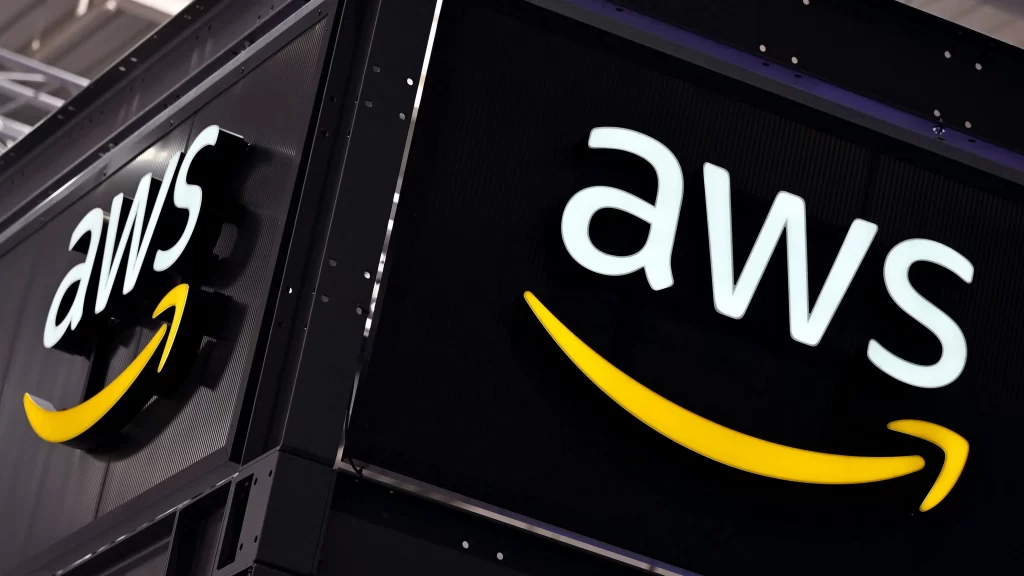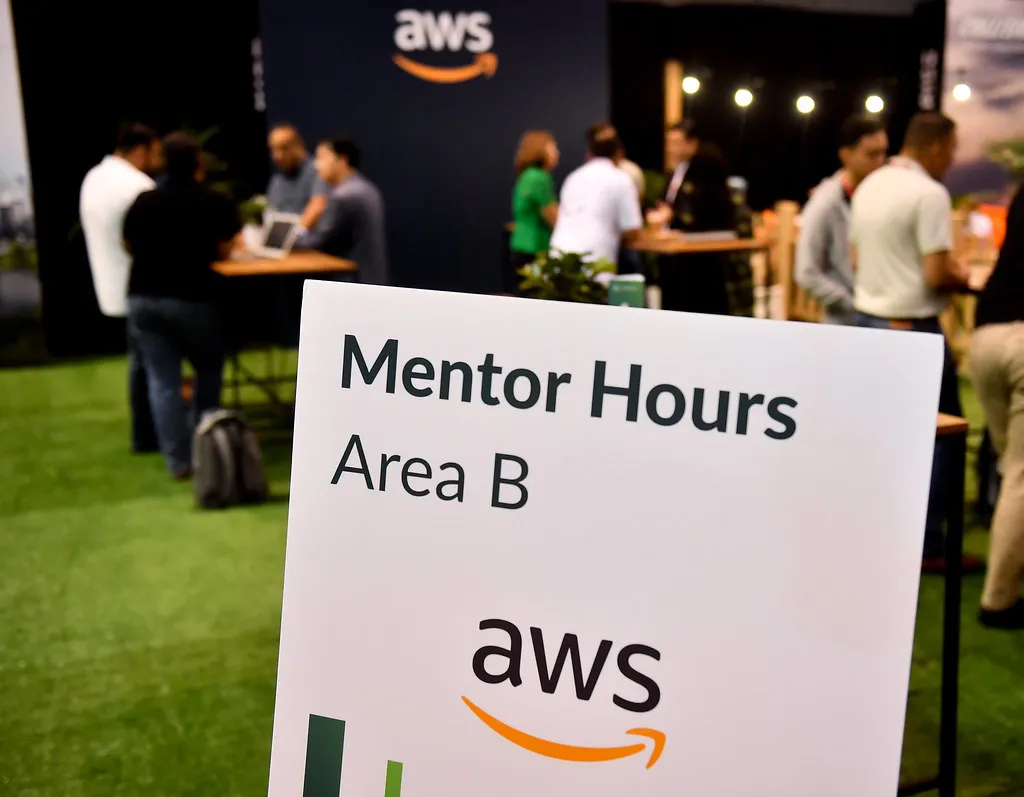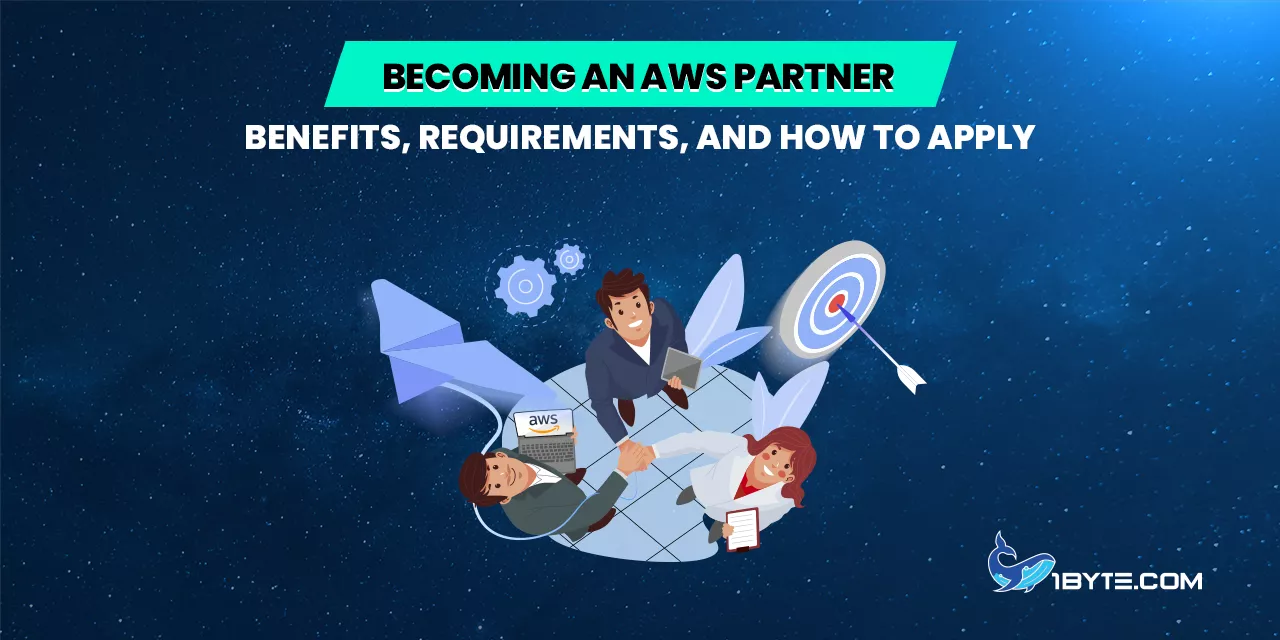Becoming an AWS partner is a strategic move for companies seeking to tap into the cloud market. The AWS Partner Network (APN) is a global community of technology and consulting firms that leverage AWS services to build solutions and serve customers. It includes over 140,000 partners in more than 200 countries and territories. This vast network gives partners a wider market reach and access to Amazon’s cloud expertise. Companies join APN at no cost, then progress through tiered programs as they meet requirements. AWS partners benefit from training, technical support, marketing resources, co-selling opportunities, and funding incentives that help them innovate and grow their business. For example, research shows partners with broad AWS offerings can earn $6.40 for every $1 of AWS they sell, and those in co-sell programs report 51% higher revenue growth.
Read this guide from 1Byte to learn more.

Benefits of an AWS Partnership
AWS offers many tangible benefits to its partners. Partners gain global visibility and credibility. As a member of APN, a company can leverage the AWS brand and connect with millions of customers around the world. For instance, a consulting firm gains trust by listing on AWS Partner Solution Finder and by earning partner badges when it achieves competencies. A software vendor can list its products in the AWS Marketplace (now with 30,000+ listings) and reach customers who prefer AWS procurement.
Partners also get technical enablement and support. AWS provides free online training, partner-specific courses, and accreditation paths. APN partners earn AWS Promotional Credits for development and testing. Each new partner is usually assigned a Partner Development Representative (PDR) who contacts them quickly (often within one business day) to guide them through resources and next steps. These resources help partners build cloud skills and validate their solutions.
Marketing and co-selling support is another advantage. AWS invests in partner go-to-market programs. For example, co-selling with AWS can significantly boost results: one study found co-selling partners see 51% higher average revenue growth, 65% higher win rates, and 54% larger deals. In addition, 87% of customers say that AWS Specializations are a top criterion when choosing a partner. Earning an AWS specialization or competency gives partners a sales edge. For instance, AWS reports that partners in its SMB Competency program grew their SMB-related AWS business 35% faster year-over-year than peers without that credential.
Financial incentives and marketplace opportunities also drive partner success. AWS often provides funding benefits such as marketing development funds and credits to build proofs-of-concept. Partners can participate in programs like the AWS Migration Acceleration Program (MAP) to get reimbursement for customer migrations. Listing on AWS Marketplace can open large sales channels: Forrester found marketplace Channel Partners saw deal sizes 4–5× larger and deals closing up to 50% faster, with an overall 234% ROI on their marketplace activities. These examples show that by joining AWS and using its partner programs, companies can accelerate sales and improve profitability.
- Access to millions of customers: APN has 140,000+ partners worldwide, so new partners instantly link into a global ecosystem.
- Technical training and certifications: AWS provides subsidized training and requires certified staff. Partners can earn free AWS credits for development as they progress.
- Dedicated partner support: A Partner Development Representative reaches out to guide new partners. Partners can also collaborate with AWS account teams on customer projects through the ACE program and co-sell motions.
- Marketing and visibility: Partners can earn AWS Partner Tier badges, get featured in Solution Finder, and use AWS co-branding resources. Listing on AWS Marketplace expands reach to customers who shop the AWS catalog.
- Funding and go-to-market assistance: Programs provide promotional credits and funds for proof-of-concepts, technical reviews, and joint marketing. Partners also qualify for AWS Specializations or Competencies (security, AI, IoT, etc.) which deepen trust and marketing support.
For example, Jenkins Valley (a managed service provider) noted that AWS’s co-sell incentives helped align AWS sales teams with the partner’s success. Others, like Pega, say that AWS has “united” them with other key technology partners, simplifying client engagements. In short, AWS partner programs are designed to help members innovate faster, lower costs, and increase sales. Gartner projected global IT spending to hit $5 trillion in 2024, and AWS partners are positioned to capture a share of that growth by leveraging AWS’s platform and go-to-market engine.
Requirements to Join AWS Partner Network
AWS makes it straightforward to start, but partners must meet specific requirements to earn formal recognition. First, registration is free. Any company can create an account on AWS Partner Central and enroll in APN. Upon registering, partners select a Partner Path that fits their business (such as Software, Services, Training, Distribution, or Hardware). Each path has tailored guidance and resources.
To achieve official partner tiers (Select, Advanced, Premier), companies must meet defined criteria. All tiers require an annual APN fee (currently $2,500 USD). This fee is rebated as AWS Promotional Credits in many cases, effectively reducing the net cost. In addition to the fee, partners must have qualified staff and track record of AWS projects. For example, the AWS Services Partner Tiers page lists minimum requirements for consulting partners:
- Knowledge (Accreditations & Certifications): A Select-tier partner must have at least 4 APN-accredited individuals (2 technical and 2 business) and 2 AWS Foundational Certification holders. Advanced-tier requires 8 accredited (4 technical + 4 business) and 4 AWS Foundational Certifications. Premier-tier demands 20 accredited individuals (10 technical + 10 business) and 10 AWS Foundational Certifications. In addition, technical staff must have AWS Associate or higher certifications (e.g. Advanced needs 6 technical certified individuals, Premier needs 25 with at least 10 Professional/Specialty).
- Experience (Customer Engagements): Partners report their AWS engagements through the portal. To qualify for Select, a partner must have launched 3 AWS customer projects generating at least $1,500 monthly recurring revenue. Advanced-tier requires 20 such projects (≥$10,000 MRR), and Premier-tier 50 projects (≥$50,000 MRR). Advanced and Premier partners must also submit a business plan.
Meeting these requirements shows AWS that the partner has real AWS skills and customer success. AWS reviews partner applications and may follow up for additional details. Importantly, requirements vary by partner path. For instance, ISV (software) partners may focus more on having a product listed in AWS Marketplace and passing the Foundational Technical Review. APN membership never expires as long as the company maintains the fee and ongoing certification requirements.

How to Apply to Become an AWS Partner
The application process is well-documented and supported.
Step 1: Register on AWS Partner Central
A company signs in with an AWS account (or creates one) and completes the APN registration form. At registration, the company chooses its Partner Path(s) based on whether it builds software, hardware, offers services, provides training, or works through distribution.
Step 2: Build AWS Readiness
Partners should establish their AWS technical foundation. This often means getting one or more solutions production-ready on AWS, training staff via the APN Navigate or other programs, and, for software companies, preparing to submit the AWS Foundational Technical Review. During this step, partners craft their AWS value proposition and “Better Together” story, which explains how their solution combines with AWS to solve customer problems.
Step 3: Meet Eligibility Criteria
As noted above, partners work toward the tier requirements. They earn AWS certifications (the partner portal gives free exam vouchers for many levels), accumulate customer references, and prepare the documentation (customer case studies, architectures, whitepapers) that APN asks for. Partners may also engage with AWS through programs like AWS Marketplace, which can accelerate their path. For startups or ISVs, AWS often includes promotional credits (e.g. $3,500 USD) when they pay the APN fee.
Step 4: Upgrade Your Partner Tier
Once ready, the company requests the tier upgrade on Partner Central. AWS reviews compliance with the published requirements (certificates, references, etc.) and grants the tier status. At that point, the partner unlocks all tier benefits (specializations eligibility, marketing funds, etc.). AWS may assign a Partner Development Manager to large partners to further accelerate their growth.
Throughout this process, partner communications tools are available. AWS Partner Central provides a dashboard of requirements, benefits, and funding. Partners can use online tools like Marketing Central for co-brandable content and APN webinars for guidance. If any step is unclear, partners are encouraged to contact AWS Partner support (often the PDR or a Partner Solutions Architect) for clarification.
Conclusion
Becoming an AWS partner is a structured process that yields significant rewards. By joining the APN, a company aligns with the leading cloud provider and gains resources to innovate and scale. AWS partners enjoy subsidized training, technical reviews, go-to-market support, and access to AWS sales channels. As cloud usage accelerates (global spending is projected to reach $1.6 trillion by 2028), APN partners are positioned to capture a large portion of that growth. In fact, AWS research shows partners who embrace the AWS ecosystem can achieve much larger deals and faster sales: for example, partners selling via AWS Marketplace saw deals close twice as fast and averaged a 234% ROI.In practice, companies that become AWS partners often report higher credibility and greater sales momentum. They can highlight AWS-specialized solutions to customers (87% of whom say specializations matter) and co-sell with AWS to win bigger projects. To start, a business simply registers on AWS Partner Central and follows the APN guidelines. From there, meeting the tier criteria and actively engaging in APN programs will unlock the full spectrum of benefits. The path of becoming an AWS partner ultimately helps companies build proven cloud solutions, lower risks, and accelerate profitable growth in today’s competitive cloud market.

